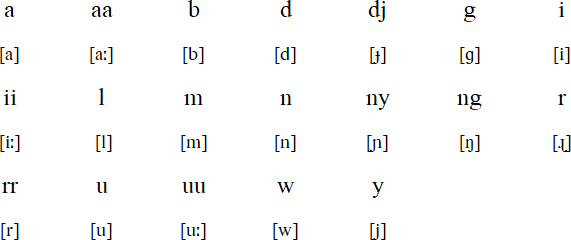Djabugay is a Pama-Nyungan language spoken in the Cairns Region of Far North Queensland in the northeast of Australia, particularly between Cairns and Atherton, on Mount Molloy, and along the Barron River. According to the 2021 census, there are 81 native speakers of Djabugay. It is spoken mainly by the Djabuganydji people.
Historically, Djabugay was spoken by the Djabuganydji, Bulwanydji, Nyagali, Yirrganydji and Gulunydji people. The Djabuganydji called it, and still call it, Djabugay; the Bulwanydji called it Bulway; the Yirrganydji called it Yirrgay, and the Gulunydji called it Guluy. Other names for the language include Tjapukai, Dyaabugay, Djabugandyi and Tja:pukanja.
Since 1986, Michael Quinn, an antropologist from England, has worked with Djabugay people to document and revitalise their language. He has produced teaching materials, films and recordings of music in Djabugay.
Djabugay is written with the Latin alphabet. It has been taught in some schools since the 1980s, and there are currently community language classes for the whole community.

Download an alphabet chart for Djabugay (Excel)
Information about Djabugay
https://en.wikipedia.org/wiki/Djabugay_language
https://djabugay.org.au/Ngirrma/language-program.html
https://djabugay.org.au/contact.html
https://nspirement.com/2020/12/19/djabugay-the-near-extinct-australian-language.html
https://glottolog.org/resource/languoid/id/dyaa1242
Alyawarr, Arrernte, Bundjalung, Dharawal, Dhuwal, Diyari, Djabugay, Djinang, Djinba, Gamilaraay, Gooniyandi, Gugadja, Guugu Yalandji, Guugu Yimithirr, Kala Lagaw Ya, Kalkatungu, Kaurna, Kuku Nyungkal, Kunjen, Kuuk Thaayorre, Lamalama, Martu Wangka, Ngaanyatjarra, Ngiyambaa, Nhangu, Noongar, Paakantyi, Pintupi, Pitjantjatjara, Warlpiri, Wemba Wemba, Wik-Mungkan, Wiradjuri, Yankunytjatjara, Yindjibarndi, Yolŋu
Languages written with the Latin alphabet
Page created: 07.10.24. Last modified: 07.10.24
[top]
You can support this site by Buying Me A Coffee, and if you like what you see on this page, you can use the buttons below to share it with people you know.

If you like this site and find it useful, you can support it by making a donation via PayPal or Patreon, or by contributing in other ways. Omniglot is how I make my living.
Note: all links on this site to Amazon.com, Amazon.co.uk
and Amazon.fr
are affiliate links. This means I earn a commission if you click on any of them and buy something. So by clicking on these links you can help to support this site.
[top]